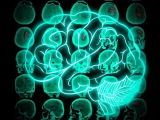May 31, 2005 (CIDRAP News) Resveratrol, a chemical found in grapes and other fruits, inhibits the reproduction of influenza viruses in cell culture and mice, according to a recent report in the Journal of Infectious Diseases.
Rather than directly attacking the flu virus itself, resveratrol seems to block host-cell functions that are essential for viral replication, says the report by Anna T. Palamara and colleagues at the University of Rome. They write that the substance holds promise as a possible weapon against flu.
Resveratrol is an antioxidant that is found in at least 72 plant species and is known to help protect the heart and nervous system and help prevent cancer, says the report. The researchers did a series of experiments in which they exposed cells to a flu virus and added resveratrol an hour later. They also exposed groups of mice to the virus and treated them with resveratrol or a placebo.
In an initial cell-culture experiment, treatment with resveratrol at 20 mcg/mL reduced flu virus replication 90%, and treatment with 40 mcg/mL blocked replication completely. However, because the higher concentration damaged the cells, the lower concentration was used in further tests.
The researchers also tested the effects of starting resveratrol treatment at different intervals after infecting cells with the virus. Treatment was most effectivereducing viral growth 87.5%when treatment began 3 hours after virus exposure. Effects were lower but still significant when treatment began 6 hours after infection, and treatment had no significant benefit if delayed until 9 hours after infection.
Given these and other findings, the researchers concluded that resveratrol interferes with the manufacture of proteins made late in the viral replication process, such as hemagglutinin, and limits the transport of viral ribonucleoproteins from the cell nucleus to the cytoplasm. The authors also determined that the molecular mechanism for resveratrol's effects has to do with the inhibition of protein kinase C activity and its dependent pathways.
In the tests on mice, the researchers found that resveratrol treatment increased survival by 40% in treated mice, compared with mice that received a placebo. The level of virus found in the lungs 6 days after infection was 98% lower in treated mice than in the placebo group.
"We have shown that RV [resveratrol], a natural polyphenol whose concentration in red wine is 1.5-3.0 mg/L, can inhibit the in vitro and in vivo replication of influenza A virus without producing any significant toxicity," the article states.
The apparent ability of resveratrol to block host-cell functions that flu viruses rely on offers important advantages, the researchers say. Compared with existing anti-flu drugs, resveratrol would be less likely to induce resistance by flu viruses, and it would probably be effective for all types and strains of flu virus.
"For these reasons, RV merits further investigation as a potential weapon for combating the growing threat of influenza," the authors conclude.
Palamara AT, Nencioni L, Aquilano K, et al. Inhibition of influenza A virus replication by resveratrol. J Infect Dis 2005 May 15;191(10):1719-29 [Abstract]


















